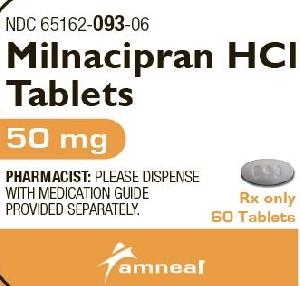Milnacipran Interactions
There are 385 drugs known to interact with milnacipran, along with 9 disease interactions, and 2 alcohol/food interactions. Of the total drug interactions, 97 are major, 287 are moderate, and 1 is minor.
- View all 385 medications that may interact with milnacipran
- View milnacipran alcohol/food interactions (2)
- View milnacipran disease interactions (9)
Most frequently checked interactions
View interaction reports for milnacipran and the medicines listed below.
- 5-HTP (5-hydroxytryptophan)
- Aspirin Low Strength (aspirin)
- Benadryl (diphenhydramine)
- Claritin (loratadine)
- CoQ10 (ubiquinone)
- Cymbalta (duloxetine)
- Effexor (venlafaxine)
- Eliquis (apixaban)
- Fentanyl Transdermal System (fentanyl)
- Fish Oil (omega-3 polyunsaturated fatty acids)
- Flexeril (cyclobenzaprine)
- Flonase (fluticasone nasal)
- Linzess (linaclotide)
- Lyrica (pregabalin)
- Metoprolol Tartrate (metoprolol)
- MiraLAX (polyethylene glycol 3350)
- Neurontin (gabapentin)
- Ozempic (semaglutide)
- Paracetamol (acetaminophen)
- Phenergan (promethazine)
- Plaquenil (hydroxychloroquine)
- Plavix (clopidogrel)
- Pristiq (desvenlafaxine)
- Probiotic Formula (bifidobacterium infantis / lactobacillus acidophilus)
- Protonix (pantoprazole)
- Prozac (fluoxetine)
- Tylenol (acetaminophen)
- Vitamin B12 (cyanocobalamin)
- Vitamin C (ascorbic acid)
- Vitamin D3 (cholecalciferol)
Milnacipran alcohol/food interactions
There are 2 alcohol/food interactions with milnacipran.
Milnacipran disease interactions
There are 9 disease interactions with milnacipran which include:
- liver disease
- depression
- renal disease
- glaucoma
- hypertension
- hyponatremia
- mania
- seizures
- urinary tract obstruction
More about milnacipran
- milnacipran consumer information
- Compare alternatives
- Reviews (362)
- Drug images
- Side effects
- Dosage information
- During pregnancy
- Drug class: serotonin-norepinephrine reuptake inhibitors
- Breastfeeding
- En español
Related treatment guides
Drug Interaction Classification
| Highly clinically significant. Avoid combinations; the risk of the interaction outweighs the benefit. | |
| Moderately clinically significant. Usually avoid combinations; use it only under special circumstances. | |
| Minimally clinically significant. Minimize risk; assess risk and consider an alternative drug, take steps to circumvent the interaction risk and/or institute a monitoring plan. | |
| No interaction information available. |
See also:
Further information
Always consult your healthcare provider to ensure the information displayed on this page applies to your personal circumstances.


